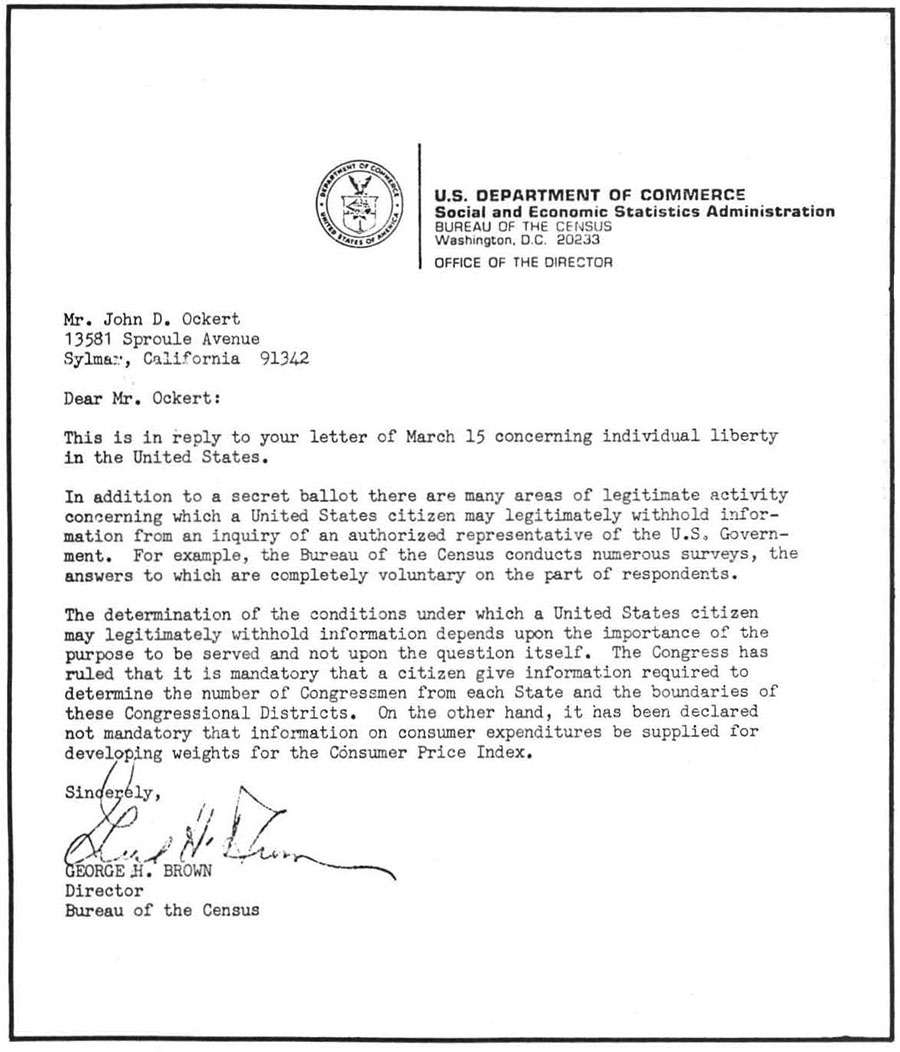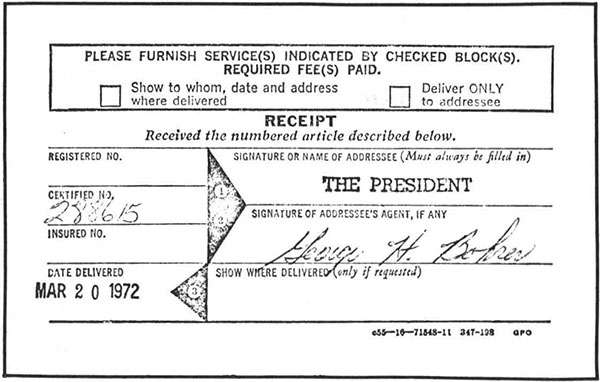The Right to Withhold: Does It Exist?
Accompanying the sundry throngs fixated on attention-snapping gambits, available to provide philosophical and political indigestion to inquiries of whatever bias, has been the cool, keen, penetrating, analytical intellect of the Director of Research of the Ockert Research Institute—Ockert himself. For a long time he and others have suffered with each curtailment of freedom each encroachment of bureaucracy, each tenuous tentacle of tortuous tenacity constricting the individual's power of choices. Others too have noted, protested, written and orated in vain. Like some self-perpetuating Juggernaut the bureaucracy rolls on—accumulating size and power, reaching into more and more facets of persons' lives, voiding increasing areas of privacy—even to the required viewing on demand of rectum and/or vagina by customs officials suspecting contraband. Ockert feels there should be an "l" of a difference between public and pubic interest. Total financial disclosure is the presumptive right of the Bureau of Infernal Revenue and the literature is replete with the records of human sacrifices exacted from those whose capitulation to their demands was made with excessive hesitancy. Yet this economic strangulation technique was adopted straight from the pen of Karl Marx, The Godless Father.
Protection is supposedly offered by surrounding the citizen with monitoring electronic devices recording his private conversations. But then are made available for high officials, the recorded chronology of sexual peccadillos to pop their late-night jollies over, if we believe Jack Anderson.
The Census bureau can ask any damn question it desires, some of which you are by law required to answer, or find your butt fined and/or in the can. Other questions are supposedly answered voluntarily at the citizen's option but the questioner doesn't necessarily divulge which are which.
ISSUE POSED BY ORI
It occurred to the Institute's Director—Ockert—to pose the question, "Does there exist a definable area of legitimate activity, information concerning which a United States citizen might legitimately withhold from the inquiry of an authorized representative of the United States Government?" In other words, at what point, if any, can one tell the government snoops to kiss off and not be sorely chastized therefor. Or, if none exist, then we are indeed considered puppets of the bureaucracy and let us act accordingly. To be sure if you commit a crime the Fifth Amendment will not only guarantee your right to withhold pertinent data but will free you from any penalties attendant thereunto should such information be extracted from you without your being advised of your right to remain silent. But what if you don't commit a crime? Do you have equal rights under the law not to divulge that which you wish not to divulge on any subject or don't you? This is the issue to which the Institute has addressed itself.
How would you go about it? Well this was the first major problem to confront the Research Director and he confronted it right back. You direct an inquiry to those whose powers encompass and whose decisions most profoundly affect these specific areas. And so, with a residuum of Sophomoric chutzpah, last year Ockert directed the following certified letter independently to the three people in our government who were positioned best to answer. President Nixon, Chief Justice Burger and Director of Census Bureau Brown. Thus exercising the right to petition the government for the redress of grievances.
Dear—
I am inquiring as to the existence of individual liberty in the United States, an area which your decisions greatly influence. I would like you to respond to the following questions.
Question 1. To your knowledge, excepting the right to a secret ballot, does there exist a definable area of legitimate activity, information concerning which, a United States Citizen might legitimately withhold from the inquiry of an authorized representative of the U.S. Government?
Question 2. If your answer to question 1 is yes would you please define such an area or several if you can think of them? No representation will be made from your answers—if any—to these questions that they, your answers, have exhausted the subject being addressed. This is an "existence" enquiry not one of extent.
Question 3. Assuming your answer to question one was yes and your answer to question 2 was non empty, would you please list several—not more than 10—relevant and substantive questions for each area identified in your answer to question 2, which a U.S. Citizen might justifiably refuse to answer "ASSUMING" they were asked by an authorized representative of the U.S. Government?
We all recognize the obligation of the citizen to give true and complete testimony when under oath in the court room so that the truth may emerge and justice be more closely approximated. This does not apply to the enquiry.
We also recognize the Fifth Amendment protections which one may invoke against giving information which might be used to convict him. These are not areas of consideration. What I seek is the existence, if any, of the right of a citizen to be secure from the inquisitiveness of his government—however well intentioned that inquisitiveness may be, in short, the right to withhold. Is there one? By virtue of your position you are involved at the decision level of these considerations.
For your information I intend to subject your response as of 4/20/72 or lack thereof to a critical evaluation monitored by whatever fairness I can muster and limited by whatever bias slips past the aforementioned mustered fairness and submit this letter, your response and my evaluation for publication.
Hoping to hear from you, I am
Sincerely yours,
John D. Ockert
P.S. These questions have been composed with some care so kindly avoid the forensic hazards of a casual answer.
The letters were sent on or about March 16, 1972 and the correspondents were given until April 20, 1972 to respond or not as inclined.
RESPONSES
The first response emanated from the Supreme Court, not as you might suppose directly from the pen of Warren Burger himself, but on the stationery of Court Clerk E. Robert Seaver whose typed name was x'd out and over which appeared the typed name of Michael Rodak, Jr. under which appeared the signature by L.M. Covey, Assistant. Indeed this response actually was delivered one day before the return receipt arrived so they cannot be faulted for unpromptness.
However, Seaver, Rodak Jr., Covey, et al indicate that "…it is not possible for the Court to answer the question you present." It is an established principle of law that the acts of an agent are considered as the acts of him on whose behalf the agent acts. If indeed this be true the Republic is in great danger for if the Chief Justice cannot define an area of legitimate privacy who the hell can, and how can one make a proper legitimate decision in this regard. Seaver, Rodak Jr., and Covey say that Chief Justice Burger is by law limited to excluding considerations of items brought before them in this manner. This may well be true. However, Justice Burger and his associates are the final arbiters of that law and indeed have the sworn obligations to provide for the citizenry the protections of the Constitution and the implementation and actualization of these rights and freedoms and protections. This obligation of theirs should have far greater priority than the formalities of the "regular course". The function of the implementation of liberty should monitor the form in which this implementation is effectuated and if, as Mr. Covey's letter indicates, the form is more important than the function, the Republic is indeed in trouble and the court has exhausted its value to the Republic, and to the citizen.
Mr. Brown, the Director of the Census Bureau, extended to Ockert the courtesy of a response and is herewith thanked. His letter is reprinted for your perusal and analysis. The key point from the Ockert's viewpoint is the first sentence of the third paragraph. It should be apparent by now to the perceptive reader that this inquiry while hoping to establish some area of personal privacy, was at the same time seeking whatever evidence may exist from government sources which would demonstrate the augmentation or conversely the vitiation of personal freedom vectors currently operant in the Republic.
Had Mr. Brown been stretched on the rack with a vein full of sodium pentothal, he could not have given a more revealing sentence even though he were reading from a pre-composed script.

The complete context you have to judge from yourself, but consider this gem. "The determination of the conditions under which a United States citizen may legitimately withhold information depends upon the importance of the purpose to be served and not upon the question itself." And that says it all. Those items you have not divulged to your government are withheld not by any inalienable right to privacy which you possess—you don't possess any. They are untendered only by the clemency of governmental sufference because the government does not deem it of sufficient importance—yet.
The White House, too, received the identical inquiry and we have saved them for last since they contributed least. Other than the returned receipt (reproduced below) no attempt was made to answer the question.
Or perhaps that is really the answer. If Mr. Nixon really believes no area of privacy is the legitimate property of any citizen perhaps he, in not answering, actually listed the TOTALITY of such areas—to wit the NULL SET. Let's hear it for the new math. Oh to be sure he was busy in 1972 with visits to China, Russia, reelection, etc. and the Institute's Director was for a short moment hesitant to intrude upon such a busy important schedule.

However a reexamination of the priorities would put the case of personal freedom and the right to privacy far ahead of the importance of telephoning plays to assorted football teams so it would seem a legitimate claim on the President's attention. But it is not to Ockert or Ockert's Institute that Mr. Nixon is obligated to answer. It is to the American people whose liberty and freedom he is sworn to uphold and defend. So, on your behalf, Ockert once again enjoins the president and the Supreme Court to speak to the question: The right to withhold—Does it exist? But supposing they don't. God's Holy word indicates the precedential response which Dr. Graham can perchance spell out in more eloquent detail. Replacing "Inhabitants" by the word "bureaucrats" in Numbers 33:55 we find; "But if ye will not drive out the 'bureaucrats' of the land and from before you, then it shall come to pass that those which ye let remain of them shall be pricks in your eyes and thorns in your sides and shall vex you in the land wherein ye dwell". —Selah
John Ockert, who acted as Director of Research of the Ockert Research Institute, authored "Save Our Smog," which appeared in the January 1972 issue of REASON. Following the exchange of correspondence discussed in "The Right To Withhold—Does It Exist?", Ockert left his position as a high school mathematics teacher in Southern California to move to New Zealand, in search of freer surroundings. He submitted this piece to REASON some months prior to his recent untimely death from illness, complicated by pneumonia.
This article originally appeared in print under the headline "The Right to Withhold: Does It Exist?."


Show Comments (0)